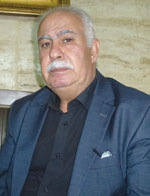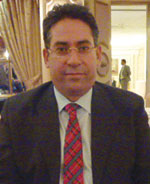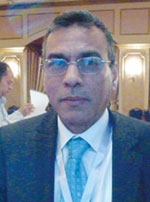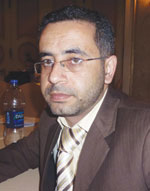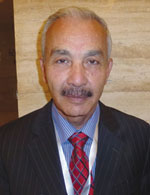
|
 |
 |
|
|
|
|
|
|
|
|
|
|
|
|
|
|
|
|
|
|
|
|
|
|
Arab experts:Reconciliation and Transitional Justice are Essential for BahrainBahrain Human Rights Monitor met several human rights activists and experts during a conference held in Cairo in April 2012, which was entitled ‘Bahrain: From Crisis to Stability’. During the conference the political, social, legal and human rights aspects of the events in Bahrain were discussed. Moreover the conference addressed the challenges, background for some of the problems, alleviation of the crisis and the role of both human rights organizations and the Government. The meeting and discussions revealed that the different parties shared several ideas and findings. Bassiouni’s report: first step for settling the crisisTo what extent can Bassiouni’s report become a reference point for solving the existing political and human rights problem in Bahrain? Talal Okal, The investigations that took place in Bahrain by Bassiouni’s Committee and the involvement of the international community gave the impression of international interference, what do you think of this? Is there any relationship between these investigations and international law?
Dr. Mosaed Abdulati an expert of international law: the establishment of Bassiouni’s Committee and its investigations are in line with international law which is part of the International Bill of Human Rights. We commended the courageous step taken by the King of Bahrain to establish this committee, appoint an international expert in international criminal law to lead it and was granted the mandate to do its work which in fact is unprecedented in the Arab world. I believe that all the concerned parties in Bahrain are invited to take advantage of this opportunity in order to achieve reconciliation which is in the best interest of the general public. Where are we heading if the implementation of the Bassiouni’s recommendations is completed?
Dr. Bassiouni Hamada, a lecturer in the Faculty of Information at Cairo University: Bassiouni’s report laid the foundation for a period of transitional justice and stressed the principles of citizenship, the rule of law, diversity and the importance of building a modern state by allowing more freedom and public participation in decision making. The report is not only dealing with the violations but also presented a picture for the future of Bahrain. How much have the steps taken by the Bahrain Government regarding the implementation of the recommendation contributed to promoting the principle of transitional justice?
Samir Moosa, a researcher and a lawyer in the Palestinian Conscience Foundation: Bassiouni’s report was supposed to be the first step towards the process of transitional justice which can only be achieved with the agreement of all Bahraini parties. The positive steps taken by the Government of Bahrain do not relate to the strategy of transitional justice but is a mere response to Bassiouni’s recommendations. For example, the established compensation fund is very much related to the principle of transition of justice, although the approach here is different. The role of human rights organizationsHow can we evaluate the influence of the international community which includes governments and civil society organizations with regards to the events in Bahrain? Dr. Emad Awad, International human rights organizations have concentrated on following the violations without taking into consideration the deep political aspects and especially the sectarian conflict. I think that these organizations are concerned with the Bahraini political situation from a human rights perspective. There is a complaint that Bahraini civil organizations were not active during the events. What can they do to decrease violence, sectarianism and extremism? Naeem Al Onayzat,
Bahraini civil societies can organise social debates which can bring social components together and discuss the reasons behind extremism in order to eradicate it. It is always beneficial to give these organizations the opportunity to organise TV programs for spreading awareness. Moreover, it would be a good idea if these organizations contribute as mediators between various political parties and between the Government and opposition. What can international organizations do to help in solving this crisis? Issam Younis, the General Director of Al Mezan Centre for Human Rights in Gaza: Human rights organisations should professionally deal with all public issues. The real challenge for any human rights organization appears during exceptional and difficult circumstances. They should be impartial with all parties and focus on the victims as well as the values of justice in order to solve the problem. Some Government bodies believe that international human rights reports are biased and ignore all positives and only concentrate on the negatives, to what extent are these organizations impartial, independent and not affected by foreign influences? Dr. Emad Awaad: the prominent human rights organizations are impartial and professional regardless of any political connections. In reality there is a connection between political and human rights objectives. In general, human rights have become a political issue and involve issues such as international trials and political relations. The main objective of human rights organizations is improving the human rights situation in all countries and highlighting any violations. Some questions were left without ansewers like the? reasons behind these violations and whether they have been provoked? These organisations shed the light and focus on human rights violations when they take place in any country and reports and statements are issued. For example, the HRW criticizes the Bahraini Government’s procedures in implementing Bassiouni’s recommendations and says that they are not genuine. In fact, some recommendations were implemented and there are statements that state that the rest will be implemented but need some time. Some organizations are in hurry and concentrate on the victims; their reports should be balanced and provide an explanation within the political context. How do you view the human rights experience and what are the shortcomings? Dr. Hasan Moosa, What is required is working in accordance with the international human right system which the King of Bahrain accepted and the National Action Charter which contains many articles which protect the rights of the citizens. Also, efforts are being made to implement the rest of Bassiouni’s recommendations and releasing the prisoners of conscience by Royal orders. Also, the violence on the street should stop because it hinders political solutions and affects human rights and increases social and political tension. The foreign interference factor in the crisisAccording to official and opposition statements, both refuse foreign interference in Bahrain and believe that Bahrain’s problems can only be solved by the Bahrainis themselves. Does the foreign element have a big influence on local affairs and how can we avoid its danger? Naeem Al Onayzaat: undoubtedly, the problem in Bahrain is not only local but also there are many foreign powers that have interests in the Gulf including Iran whom we cannot say does not want to interfere in Bahrain. The ability to protect Bahrain needs extensive dialogue with the protesters as well as social and political parties in general. The Government should exert more effort especially when combating sectarianism. Political societies in Bahrain should avoid sectarian discourses and express the need for a national unifying discourse. How can Bahrain avoid regional influences which could increase tension and internal conflict? Dr. Emad Awad: your question take us back to the root of the problem, which is the geographic position of Bahrain and its demography which have imposed a kind of political polarization. There are the GCC countries on one side and Iran on the other. The Bahraini people have only one chance which is to become united on the principles of citizenship, mutual interest, reform and democracy. This is in addition to promoting freedom especially when taking strategic decisions and confronting sectarianism. A way out of the political and human rights problemBased on your follow up of the Bahraini crisis, in your opinion what is the best way to solve the current problem? Dr. Hasan Moosa: Bahrain is an integral part of our Arab nations and is currently being subjected to attempts to disunite it and break down its collective identity. We support the desire of the Bahraini people for more freedom, democracy and institutional work. However, this should be achieved in a framework of a united Bahrain. Bahrain is for all Bahrainis therefore calls for freedom should not lead to sectarian conflicts and political societies should not be established on sectarian or religious bases. I believe that the way out of this crisis is for the Government to take more responsibility and push forward the national dialogue. The political parties that reject dialogue cannot solve the problem by resorting to the street. All issues are to be solved and settled on the basis of citizenship, civil peace and national reconciliation. National dialogue is essential, but dialogue cannot be initiated without certain foundations such as national identity, equality and the rejection of foreign interference. A lesson should be learnt from the Libyan experience. We would like to see our Arab world as a society based on justice, law and citizenship; we are against any religious, military or sectarian states. What are the mechanisms for solving the Bahraini problem? Issam Younis:
The lack of trust is disappointing and an obstacle to dialogue between political parties, how can this problem be solved? Bassiouni Hamada: trust cannot be built by words and meetings but by action because actions speak louder than words. Trust is very important in solving political problems and we should pay attention to the reasons behind the current mistrust between political parties. In my opinion, the most important reason is the fact that each party is expecting the best from the other. Moreover, violence, violations and taking extreme positions have badly affected the trust. Trust needs self assessment and all parties, including the Government and opposition, have contributed to this problem and should take initiatives to rebuild trust. In your opinion, what is the most important factor for avoiding social and political divisions in Bahraini society? Dr. Mosaed Abdulati, in my opinion, the most essential factor is constructive and direct dialogue between all Bahraini social segments. This dialogue should be based on good intentions from all parties and should take into consideration the general interests of all Bahrainis. Also, in order for the dialogue to succeed, all parties should avoid media statements. There are foreign interference attempts in the Bahraini crisis and a lot of mistrust between political parties. How do you see the solution? Talal Okal, there is no magical solution, but there are certain guidelines. 1- all parties should admit that a crisis exists. 2-foreign interference should be ruled out. 3-violence and extremism will not solve the problem, and all parties should be willing to engage in a comprehensive dialogue between all social segments including the Government. During the national dialogue, steps which should be taken with regards to transitional justice should be discussed in order to find a solution to the problem of mistrust and create constitutional mechanisms. I would like to stress that only Bahrainis themselves are able to solve their problems. Bahrain needs quick and practical solutions which avoids all factors which ignite political and social conflict. Bahrain contains many national capabilities and civil society organisations which could contribute in finding a way out of the crisis. Even if there are points of disagreement, they should focus on the points of agreement and this will provide the suitable mechanism to go out of the crisis. |
